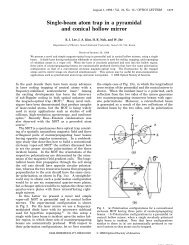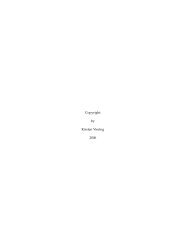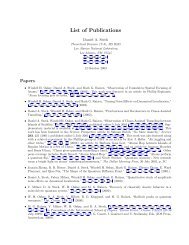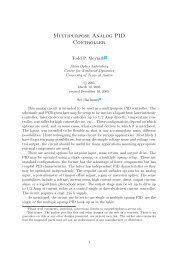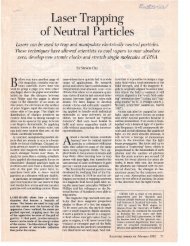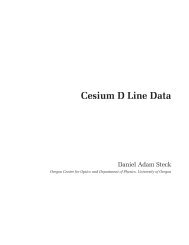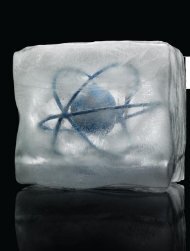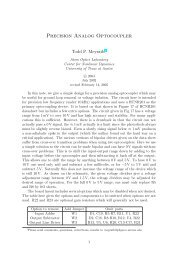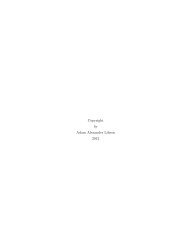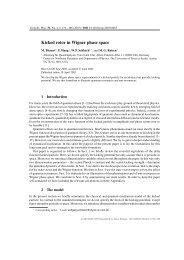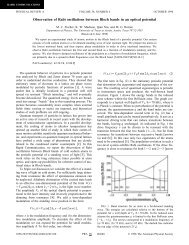- Page 1:
An Investigation of Precision and S
- Page 5 and 6:
Acknowledgments What a long, strang
- Page 7:
should totally start a band. I also
- Page 10 and 11:
2.4 Conclusions and further questio
- Page 12 and 13:
7.6.1 Regular array of stationary q
- Page 15 and 16:
List of Figures 2-1 The CNOT gate i
- Page 17:
7-12 Magnetic fields due to a “tr
- Page 21 and 22:
Chapter 1 Introduction The growth o
- Page 23 and 24:
1.1 Quantum information The concept
- Page 25 and 26:
us whether the target system obeys
- Page 27 and 28:
Nevertheless, there are a number of
- Page 29 and 30: Digital Analog Classical Quantum Sp
- Page 31 and 32: electrodes [TKK + 99]. This heating
- Page 33 and 34: Digital Analog Classical Quantum Sp
- Page 35 and 36: 2. Initialization to a simple fiduc
- Page 37 and 38: qubits, and in Ref. [SGA + 05] in t
- Page 39 and 40: the lattice architecture, we discov
- Page 41 and 42: 1.6 Contributions to this work In t
- Page 43: 5) Ref. [DLC + 09b] Wiring up trapp
- Page 47 and 48: Chapter 2 Quantum simulation using
- Page 49 and 50: µN the nuclear magneton, and B0 th
- Page 51 and 52: ⎡ ⎤ a 0 0 0 ⎢ ⎥ ⎢ ρ2 =
- Page 53 and 54: The same effect as number 2 above i
- Page 55 and 56: where V0 is the maximum signal stre
- Page 57 and 58: actions that occur between nuclei i
- Page 59 and 60: Figure 2-2: The 2,3-dibromothiophen
- Page 61: detail how this was done with a sim
- Page 64 and 65: and thus requires invocation of the
- Page 66 and 67: Renormalization Group (DMRG), with
- Page 68 and 69: 3.3 The bounds on precision In this
- Page 70 and 71: Figure 3-1: A schematic of a generi
- Page 72 and 73: Figure 3-3: The 11.7 T, 500 MHz sup
- Page 74 and 75: . Figure 3-4: The above probe is a
- Page 76 and 77: Figure 3-5: The CHFBr2 molecule. Al
- Page 78 and 79: Figure 3-6: Frequency-domain spectr
- Page 83 and 84: Chapter 4 Theory and history of qua
- Page 85 and 86: GND RF r ENDCAP 0 z 0 ENDCAP Ring T
- Page 87 and 88: where Q is the charge of the trappe
- Page 89 and 90: angular momentum along the quantiza
- Page 91 and 92: emission from the excited state |
- Page 93 and 94: selection rule ∆m = ±1 is applie
- Page 95 and 96: Figure 4-3: Schematic diagram of sp
- Page 97 and 98: to address an ion in state |↑〉
- Page 99 and 100: the vibrational temperature is low.
- Page 101 and 102: to the design of the trap itself. M
- Page 103 and 104: to the quantum-mechanical ground st
- Page 105 and 106: Chapter 5 Lattice ion traps for qua
- Page 107 and 108: Figure 5-1: Schematic of the lattic
- Page 109 and 110: Figure 5-3: Fit to Eq. 5.2 of the C
- Page 111 and 112: Figure 5-4: The vacuum chamber for
- Page 113 and 114: weeks. Low pressures depend on choo
- Page 115 and 116: Figure 5-5: Left: Level diagram for
- Page 117 and 118: Figure 5-7: (a) Schematic of the cr
- Page 119 and 120: (a) Lattice Trap Schematic TOP PLAT
- Page 121 and 122: mix the microspheres evenly in the
- Page 123 and 124: Using the expression for ωˆr deri
- Page 125 and 126: Figure 5-15: Plot of the motional c
- Page 127 and 128: Figure 5-17: Dependence of the trap
- Page 129 and 130: Chapter 6 Surface-electrode PCB ion
- Page 131 and 132:
Figure 6-1: Schematic of a linear i
- Page 133 and 134:
Figure 6-2: Layout of the trap elec
- Page 135 and 136:
Figure 6-3: Above are the cross sec
- Page 137 and 138:
Figure 6-6: Photograph of the trap
- Page 139 and 140:
Figure 6-8: CCD image of a cloud of
- Page 141 and 142:
Figure 6-9: Measurement results sho
- Page 143 and 144:
Figure 6-11: Bastille mounted in th
- Page 145 and 146:
Figure 6-13: A diagram of the setup
- Page 147 and 148:
Figure 6-14: A plot of the trapped
- Page 149 and 150:
allows us to upper-bound the amount
- Page 151 and 152:
Chapter 7 Quantum simulation in sur
- Page 153 and 154:
Figure 7-1: Left: Uraniborg 1, as r
- Page 155 and 156:
Figure 7-3: Calculated secular freq
- Page 157 and 158:
Figure 7-5: Left: Structure of 2-D
- Page 159 and 160:
Figure 7-7: Scaling of the order of
- Page 161 and 162:
involved. Because ions near the cen
- Page 163 and 164:
Results Before presenting the numer
- Page 165 and 166:
Figure 7-10: Calculation results fo
- Page 167 and 168:
7.3 Magnetic gradient forces Now th
- Page 169 and 170:
Figure 7-13: Scaling of the J-coupl
- Page 171 and 172:
how are single-ion operations to be
- Page 173 and 174:
250 psi, which increases to around
- Page 175 and 176:
Figure 7-18: At the center of this
- Page 177 and 178:
Figure 7-19: The plastic socket tha
- Page 179 and 180:
Figure 7-21: The two internal lense
- Page 181 and 182:
Figure 7-22: Measured secular frequ
- Page 183 and 184:
Along ˆy, the spacing is dˆy = 28
- Page 185 and 186:
of O2 to 2 × 10 −12 torr. Decohe
- Page 187 and 188:
Part III Toward ion-ion coupling ov
- Page 189 and 190:
Chapter 8 Motivation for and theory
- Page 191 and 192:
Figure 8-1: Schematic of the experi
- Page 193 and 194:
are in close agreement in the case
- Page 195 and 196:
8.2.3 Simulated coupling rates We n
- Page 197 and 198:
Johnson noise We begin our discussi
- Page 199 and 200:
should suffice. Note that the above
- Page 201 and 202:
Chapter 9 Measuring the interaction
- Page 203 and 204:
Figure 9-2: Left: Level diagram for
- Page 205 and 206:
Figure 9-5: Photograph of the micro
- Page 207 and 208:
A fit of the resulting curve return
- Page 209 and 210:
Figure 9-9: Linear fit of the ωˆy
- Page 211 and 212:
Figure 9-12: Heating rate as determ
- Page 213 and 214:
Chapter 10 Conclusions and outlook
- Page 215 and 216:
traps, linking ions using photons,
- Page 217 and 218:
Bibliography [ADM05] Paul M. Alsing
- Page 219 and 220:
[CGB + 94] J. I. Cirac, L. J. Garay
- Page 221 and 222:
[GME + 02] M. Greiner, O. Mandel, T
- Page 223 and 224:
[LCL + 07] D. R. Leibrandt, R. J. C
- Page 225 and 226:
[PC04a] D. Porras and J. I. Cirac.
- Page 227 and 228:
[TBZ05] L. Tian, R. Blatt, and P. Z
- Page 229 and 230:
Appendix A Matlab code for Ising mo
- Page 231 and 232:
err_result = mean(theerr) 231
- Page 233 and 234:
J = J0; Jt(1) = J; Bt(1) = B; for k
- Page 235 and 236:
A.3 Simulation with constant force
- Page 237 and 238:
Appendix B Mathematica code for ion
- Page 239 and 240:
2 crystal_shape_6uraniborg.nb Out[6
- Page 241 and 242:
Appendix C How to trap ions in a cl
- Page 243 and 244:
Finally, we note that the chilled w
- Page 245 and 246:
C.4 Laser alignment and imaging As




